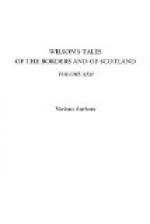Leaving me on the flagstones, Lindsay now descended into the area; but in two or three minutes returned, and motioned me with his finger to come to him.
I did so, when he told me that he had seen Susan Blaikie, and that she had invited us to come in. Into the house we accordingly went, and were conducted by Susan, a lively, pretty girl, who welcomed us with great cordiality, into what appeared to be a housekeeper’s room.
My comrade, Lindsay, having given Susan all the Scotch, particularly Glasgow, news in his budget, the latter left the room for a few minutes, when she returned with a tray of cold provisions—ham, fowl, and roast beef.
Placing these before us, and adding a bottle of excellent porter, she invited us to fall-to. We did so, and executed summary justice on the good things placed before us.
After this we sat for about half an hour, when we rose to depart. This, however, she would not permit till we had promised that we would come, on the following night, and take tea with her and one or two of her fellow-servants. This promise we readily gave, and as willingly kept. One of the party, on the night of the tea-drinking, was the footman of the establishment, Richard Digby—a rakish, dissipated-looking fellow, with an affected air, and an excessively refined and genteel manner, that is, as he himself thought it. To others, at least to me, he appeared an egregious puppy; the obvious spuriousness of his assumed gentility inspiring a disgust which I found it difficult to suppress. Neither could I suppress it so effectually as to prevent the fellow discovering it. He did so; and the consequence was the rise of a hearty and mutual dislike, which, however, neither of us evinced by any overt act.
Having found the society of our fair countrywoman and her friends very agreeable, we—that is, Lindsay and myself—became frequent visitors; drinking tea with her and her fellow-servants at least two or three times a week. While this was going on, a detachment of the new recruits, of whom Lindsay was one, was suddenly ordered to Chatham. I missed my comrade much after his departure; but as I had by this time established an intimacy with Susan and her fellow-servants on my own account, I still continued visiting there, and drinking tea occasionally as formerly.
It was on one of these occasions, and about ten days after Lindsay had left London, that as I was leaving Mr. Wallscourt’s house at a pretty late hour—I think about eleven at night—I was suddenly collared by two men, just as I had ascended the area stair, and was about to step out on the pavement.
“What’s this for?” said I, turning first to the one and then to the other of my captors.
“We’ll tell you that presently,” replied one of the men, who had by this time begun to grope about my person, as if searching for something. In a moment after—“Ah! let’s see what’s this,” he said, plunging his hand into one of my coat-pockets, and pulling out a silver table-spoon. “All right,” he added. “Come away, my lad;” and the two forthwith began dragging me along.




